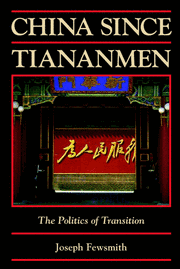Book contents
- Frontmatter
- Contents
- Acknowledgments
- Chronology
- Schematic Overview of Chinese Political Spectrum
- List of Abbreviations and Tables
- Introduction: State and Intellectuals at the Turn of the Century
- Part I Line Struggle Revisited: The Attack on Deng's Reform Program
- Part II Redefining Reform: The Search for a New Way
- 3 The Emergence of Neoconservatism
- 4 The Enlightenment Tradition under Challenge
- 5 The Emergence of Neostatism and Popular Nationalism
- Part III Elite Politics and Popular Nationalism
- Conclusion
- Epilogue
- Notes
- Bibliography
- Index
3 - The Emergence of Neoconservatism
Published online by Cambridge University Press: 05 September 2012
- Frontmatter
- Contents
- Acknowledgments
- Chronology
- Schematic Overview of Chinese Political Spectrum
- List of Abbreviations and Tables
- Introduction: State and Intellectuals at the Turn of the Century
- Part I Line Struggle Revisited: The Attack on Deng's Reform Program
- Part II Redefining Reform: The Search for a New Way
- 3 The Emergence of Neoconservatism
- 4 The Enlightenment Tradition under Challenge
- 5 The Emergence of Neostatism and Popular Nationalism
- Part III Elite Politics and Popular Nationalism
- Conclusion
- Epilogue
- Notes
- Bibliography
- Index
Summary
In the years following Tiananmen, new currents of thought began to emerge and play a significant role in social, intellectual, and political circles. Most of these currents had roots in the 1980s, but either they were more peripheral ideas that moved toward the center of intellectual concern or they underwent a significant evolution in the context of post-Tiananmen China, or both. In all cases, they reflect an effort to come to grips intellectually with the political failure of reform in the 1980s, the economic and social problems that emerged (or became more acute) in the 1990s, and the type of political system that might be effective in coping with the problems facing China, both domestically and internationally. As we will see in this and the next two chapters, deep divisions opened up within the intellectual community, even as the place of that community in Chinese society changed significantly. In broad terms, even as the government maintained its own ideological line, a new arena of public discourse developed. Over time, the government took increasing account of this public opinion, sometimes absorbing ideas from it, sometimes engaging it, and sometimes suppressing it. The purpose of Part II is to focus on intellectual developments in the 1990s; in Part III, we will look more closely at the government–intellectual interaction.
One trend that emerged in the 1980s was that of “new authoritarianism,” which re-emerged in the 1990s as “neoconservatism.”
- Type
- Chapter
- Information
- China since TiananmenThe Politics of Transition, pp. 75 - 100Publisher: Cambridge University PressPrint publication year: 2001



